|
My granddaughter, Fiona, four and a half, has officially grown out of her beloved Elsa dress, a costume based on the Disney heroine of Frozen. Her mom, my daughter Nellie, reported that the dress was retired to a closet some months ago, but recently came out again for Lucy. Little sister Lucy, going on two, now fits nicely into the Elsa dress, wears it floor-length and twirls about the room. For a long time – a year? two? more? – Fiona wore that dress perpetually: to the store, to bed, to daycare, for meals, for playtime, hiking, snowy outings, beach walks, you name it. It was the first thing into her suitcase when packing for weekends away. Her parents resisted briefly, then decided it best to choose other battles. The Elsa dress made morning dressing simpler, after all. (see blog 11/28/21) The first time Lucy wore the dress, Nellie told me, she watched Fiona from behind. Fiona, head cocked, contemplative, gazed as Lucy swirled around the room. “I loved that dress,” she said with unusual sentiment. Nellie felt a heart flutter. The second time Lucy wore the dress, Fiona went quiet again, watching her little sister twirl in the ragged blue costume. “Mommy, why is my brain making my eyes water?” she said, baffled by this inexplicable phenomenon. “Stop it, brain!” Oh my dear child. Why does this story make my eyes water? Stop it, brain.
0 Comments
My oldest grandchild is now 4 ½, and she delights me endlessly, notwithstanding the tantrums. The tantrums are understandable. It’s hard to imagine, at 63, the overwhelming brainwork of being 4. The world is an ocean of mystery, and you are at sea, floating, swimming, sailing, floundering. Language is a magical tool, and you’re only just beginning to understand how to use it, which must mean brain burnout from time to time. It also means that sometimes you come up with great wisdom, unfettered by convention.
Nellie said something to Fiona about imagining a boat. “I have two pairs of eyes,” says Fiona. “You do?” “Yes, sometimes I see with my other eyes.” “Where are they?” asks Mom. Fiona opens her mouth and points inside. Then she says, “no,” thinks for a second, and points to her forehead. “What do you see with those eyes?” asks Mom. “You said boat, and I can see a boat up here,” says Fiona, pointing to her forehead again. “Unicorn. See, I said unicorn, and I saw a unicorn.” Nellie marvels at this unfolding of thought. “My brain talks to me,” says Fiona. “My brain is pretty cool.” Indeed it is. Getting cooler by the minute. It's all my fault. On March 19th (top photo), I put my snowshoes away in the attic. I was lulled into resignation by a long stretch of springlike weather. On March 21 (bottom photo), morning brought a six-inch carpet of white, blowing in billows. For those of you impatient for warm weather - sorry! But I confess I was thrilled. I am a cool weather person, and I love snow. I felt cheated of snow this winter, so spring brought us a nice little compensation gift.
Even though Daisy is from Alabama, she was even more excited than I was to finally have a Maine snowstorm to play in. Her doggie zoomies created wild patterns of overlapping circles all over the yard. Since I didn't have my snowshoes handy, my track is just a furrow of trudging boots, but it was easy walking. This is the best snow - light, fluffy, you can blow it off the car, when you brush against a tree branch, cascades of sparkle drift around you on their way to the ground. This is late winter in Maine, and I'm basking in it. Who knows how long we will know it? In a few years we may have springs like the ones you associate with Virginia. How much of our identity is wrapped into our home climate? More than we realize, I think. Mainers are tough, rugged, resilient, able to face those infamous, unpredictable northeast storms with staunch resolve, with generosity to snowed-in neighbors without power. But what happens when all we get is a few little decorative snowfalls and a lovely, warm spring? Who will we be then? I guess we'll have to get better with ticks and invasive flora. I'd rather have snow. So maybe I'll try putting my snowshoes away early next year too. Is it time to take the Christmas lights down yet? January can be a long month here at the 44th parallel. There’s still a lot of dark time, both morning and evening, and when it’s dark my inclination is to be thinking of bedtime, slowing down, curling up in my pajamas. One reason I don’t mind waiting until mid-December before we get our Christmas tree and string fairy lights in the living room is so that the lights don’t feel too overdone, once we hit mid-January. Today I had my first inkling of a thought: hmm. Maybe it’s time to put the holidays away…but why not leave the lights up a bit longer? They do use up a bit of power, but maybe they bestow even more. Maybe, in the lift those lights offer, they produce more positive energy than they consume. Maybe a little glow is just what I need to get through the long nights of January. I get a little draggy this time of year, especially during a January like this one - no snow sparkles under the sun; no snow brightens the darkness. There's more rain expected tomorrow; floods and wind damage are wreaking havoc around the state. We need to grasp at any little thing that lightens our load, our day, our spirits. They’re so small, those tiny lights, but they have a big oomph inside a droopy head and heart. I’ll keep the lights on, just a bit longer. I remember this strange phenomenon. When I was a young mother steeped in infant care, day in and day out, my baby filled every crevice of my world, my thoughts, my preoccupations, my field of vision. Then someone offered to hold my child. They walked off a little distance, and I had a moment to look away. Turning back, I was startled to see how tiny she was, over there, away from me. How is it possible that this enormous presence is so insignificant in size? I think of that sometimes when I’m off adventuring with my husband. Not uncommonly, he finds his way to highpoints and vistas not exactly on the main path, so he appears to me as a tiny silhouette against a cavernous expanse of world, this effervescent man who has so prominently filled my universe for over 40 years. I admit it does give me pause. Seeing that my everything can quickly become an imperceivable speck is disconcerting, but it’s also a reality check. We are, each of us, almost nothing, really. It is a wondrous marvel that we are here at all, both feeling the immensity of our individual life experiences and occasionally catching a fleeting glimpse of eternity. It’s complicated, isn’t it? I want to cling to my life's treasures, and I want to fling my arms out and set everything free at the same time. When I see Jonathan as a tiny silhouette on the horizon, I feel a surge of…love? urgency? protectiveness? freedom? I am reminded to hold onto what is precious while it is near at hand, because eventually, we will all dissolve into the cavernous expanse of this extraordinary world. I will hold Jonathan’s hand and listen to his heartbeat, and I will celebrate when I chance to see him, far away, reaching out to touch the infinite sky. Tomorrow is Thanksgiving, but instead counting our blessings as we sit down to share a meal with my family, J and I are literally living a world of Castles in Spain. It’s an appropriate metaphor. J and I are in the midst of a dreamlike, monthlong exploration of Europe, currently making our way across the northernmost parts of Spain, east to west, getting lost, following our noses. Medieval villages dot the landscape, a tower here, an old walled city there, a monastery on a hill, an arched stone bridge leading into narrow, cobbled streets.
We have a lot to be thankful for. I’m thankful to have made my way into my 60s, to have the freedom, the means, and the time to travel (plus no covid restrictions and relative security in western Europe). I am thankful to meet so many people in different countries, in multiple languages (including hand gestures) who smile and help out and share a piece of their life with strangers. The world seems scary and despairing too often. When we live in the news and in social media, we miss out on the reassurance of human connection. Everywhere there are babies getting pushed in carriages, dogs trotting with their humans, cats sunning on doorsteps, children’s voices bubbling over the walls of playgrounds, people stopping for a drink, going to work, laughing, yelling into cell phones, meeting friends, stopping at crosswalks, tending to farm animals, waving hello. We have so much in common, no matter where we live. Traveling encourages the opening of boundaries, both internal and external. We’re getting opened up to the idea of dreaming again, dreaming of castles in Spain. I wish for all of you, friends, family, and passers-by, the luxury of dreaming, perhaps your own Castles in Spain. I wish you, too, the comforts of human connection – over a table laden with food, over a hot cup of coffee, on the street, on the subway, at the checkout counter. We are not as alone as we think, if we can find our way to open up and reach out. **Robin 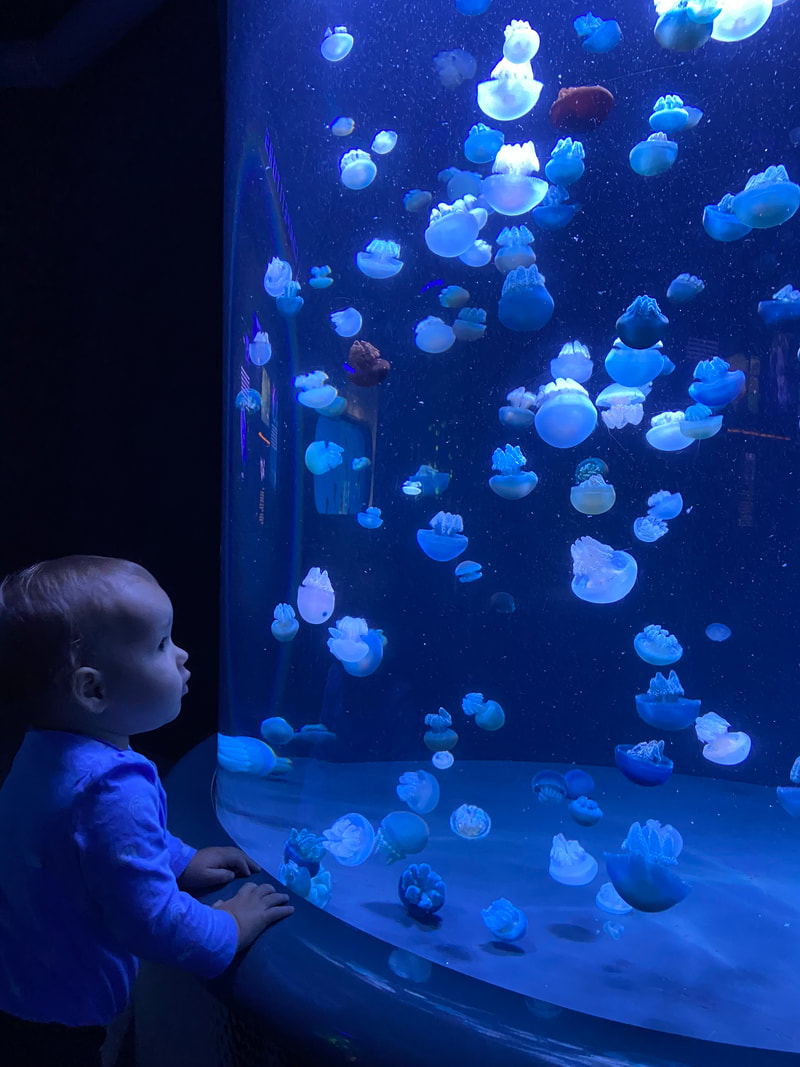 Zoe at the aquarium. I should have written it down. A scientist was on the radio recently, talking about the value of stillness, but I can’t remember her name or the program now. Most, if not all, of her innovative ideas, she said, come to her in moments of stillness, when her thoughts are left to wander undirected by external input – no phone, no computer. Only then does she come up with new ways of seeing, new ways of thinking. The world needs more stillness, she contends. Science needs more stillness.
Watching my one-year-old grandchildren (I have three of them now!), I observe exactly what that scientist means. Left alone, undirected, they are tiny scientists discovering the world. I, too, try to practice observational science when I hang out with them. If I put away my phone and any agenda of instruction, they teach me things. I watch them learn about physics as they try to balance on two feet, climb a slide, descend a staircase, or drop a handful of sweet potato onto the floor. I listen to them mimic sounds – not just human language, but birdsong, barking dogs, or a squeaky wheel. They taste the world, reach out to touch and manipulate every object. Their looks of wonder are everyday expressions, or maybe it’s not wonder but deep concentration. So many neurons firing in the brain, processing, sorting things out, fitting them into one possible interpretation, then reassigning connections as more data comes in. Learning the science of life. My grandchildren are okay with undirected time. You could call it idleness. Idleness should not carry the pejorative weight it is often assigned. There is nothing static or lazy about an idle child. In idleness they find their way, all on their own, little budding scientists. Idleness allows for stillness; stillness leads to discovery, or to sleep, when that’s what is needed. Don’t we all still have a lot to learn? Have we forgotten how to discover the world, which is new in so many ways, every day? Don’t we all need to sleep when we’re tired? Shouldn't we re-discover the science of life? Thank you little ones, for reminding me to be still. 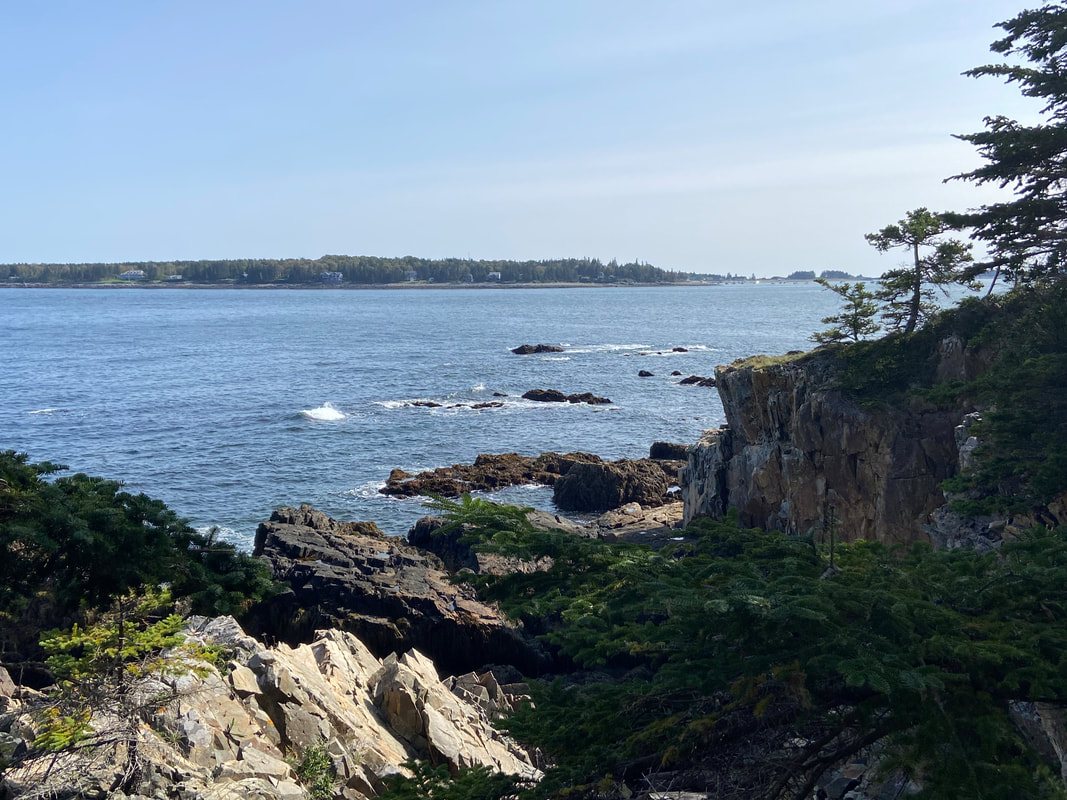 I spent a few days on Sutton Island this past week, after an intensive stretch of non-stop activity. You know the kind. My first two days I was alone, a rare situation for me on the island. On the first day I decided to take a walk around the east end loop without my phone. The number of times I reached for that darn slab of plastic and metal was embarrassing. How far have I walked? What time is it? Oh, that's beautiful; where's my camera? Has anyone texted me? Have I done Wordle today? Sutton reminds me to sit still, put my phone away, and immerse in the light and shadow of fall. Watch the gulls, eagles, osprey, heron, cormorants, loons, songbirds, and seals - all going about their lives, busy working, eating, interacting - without a thought for what's happening in some electronic other-world. The physical world is a good one, and we miss too much of it. It's our home. You'll remember it, if you give it your attention. Take a deep breath, Robin. Slow down. Immerse in the air of autumn. Can you find a time to turn off the electricity and simply be present with the natural world? I aspire to do it, but often fail. I wish you all the balm of "disconnection" too, which really means, the balm of reconnecting to the physical world. To dog or not to dog?
That was the question. Just now I looked back at the dates and saw that our dogless existence – after thirty-nine years of dogfulness – began almost exactly a year ago. Doglessness is a seductive condition. We slipped into its hypnosis for a long time, but then… This August Jonathan and I will celebrate forty years of marriage. Forty years ago, on our way home from an 8-day honeymoon in New Brunswick, we found a starving puppy on the side of the road. After an hour or so of sleuthing in the neighborhood, we learned he was abandoned. In an exuberance of love and protectiveness, we impulsively decided to smuggle him over the border (I hope the statute of limitations on penalties has passed). Brunswick lived to be sixteen. By the time he died, we’d long since adopted Ella, who was joined by Meg, then Guster, Kate, and Clara. When Clara died last June, our last dog, we had four new grandbabies on the horizon. “Let’s just wait a little bit,” we thought. In a dogless life, you can be spontaneous. You don’t have to get up on Saturday morning to walk anybody. No tumbleweeds of dog hair under the couch. No noisy interruptions. No one pestering you to pay attention, get up, go out, rub my belly. You are free to remain lost in thought, in moodiness, in yourself. Hmm. We began to see the problem. Daisy hasn’t been with us for a week yet, and we are tired, and we are happy. She is comic relief, a torrent of wriggly, twirly affection, demanding. Oh yes, she demands – that we not sink into a fog of brooding, that we pay attention, that we laugh and play and celebrate. We celebrate wonders like moths and tennis balls, tall grass and windows, sunbasking and dinnertime. We didn’t know what a hole we’d slipped into until she arrived and dragged us out on a leash. Welcome, Daisy. And thank you. 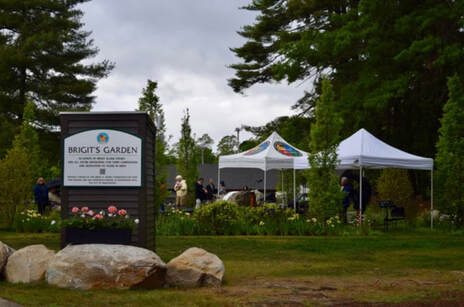 One of the gifts of small children is a reminder that we each house a full array of emotions in the crowded space of our brain, and that’s okay. Honor your emotions. Children give free rein to them all – elation, grief, frustration, fear, anger, determination, silliness, hysteria, serenity. They might get bogged down by emotional overloads (a three-year-old’s ferocity in the throes of perceived injustice is legion), but their ability to recover is wondrous. Many of us lose that ability as we grow. Maybe that’s because we try so hard to shut the door on negative emotions, a strategy that commonly backfires. I recently returned from a beautiful, heart wrenching, hopeful weekend. Two years after the tragic accidental death of Brigit Feeney, a friend’s 33-year-old daughter, her family gathered to dedicate a memorial garden. The serene, circular plot in Manchester, New Hampshire’s Livingston Park celebrates the good work of Brigit’s life. The garden honors her memory and provides a public space of beauty, solace, and healing to the entire community. Brigit worked as a victim and witness advocate, an underappreciated job that provides support for victims of violent crime at their most fragile. She was an exquisitely compassionate advocate, and a fierce ally to those in need. Brigit’s life calling was to provide hope and healing, and the foundation created in her name will work towards that goal. I marvel at this family’s response to devastating grief – to look outside of themselves, to provide comfort to others as a way of softening the pain. Laughter and tears came both in full measure in the garden that day. Adults can do this thing too, this fluid movement between emotions, this embracing of love and hope, even in the midst of anguish. Suffering in life is inevitable, but denying it, smothering it, shaming it, is counterproductive. If we open our hearts to the pain it can wash through us and leave us cleansed. I cannot help turning to my grandchildren - those dazzling, emerging beings – when I need instruction. The world of emotions is their playground, their schoolground. Little Martin, our fifth grandchild, was born in April, and already he displays tantalizing facial mobility, as though he’s experimenting with the emotional spectrum – a smile, a smirk, a frown, a brow knitted in sadness or consternation – all in his sleep. Good job, Martin. Keep practicing. To all of you, young and old, I wish you good fortune, but I also wish you the essential skill of navigating the bad when it arrives. Let the raggedy feelings come, let them move on, then bring your goodness back into the light. The Brigit A. Feeney Foundation for Hope and Healing will continue Brigit’s legacy by supporting the advocate community she cared so much about. The garden is open to the public. For more information about Brigit and the Foundation named for her, visit: https://www.brigitsfoundation.org/ |
AuthorRobin Clifford Wood is an award-winning author, poet, and writing teacher. She lives in central Maine with her husband, loves to be outdoors, and enjoys ever-expanding horizons through her children, grandchildren, and granddogs. Archives
April 2024
Categories |

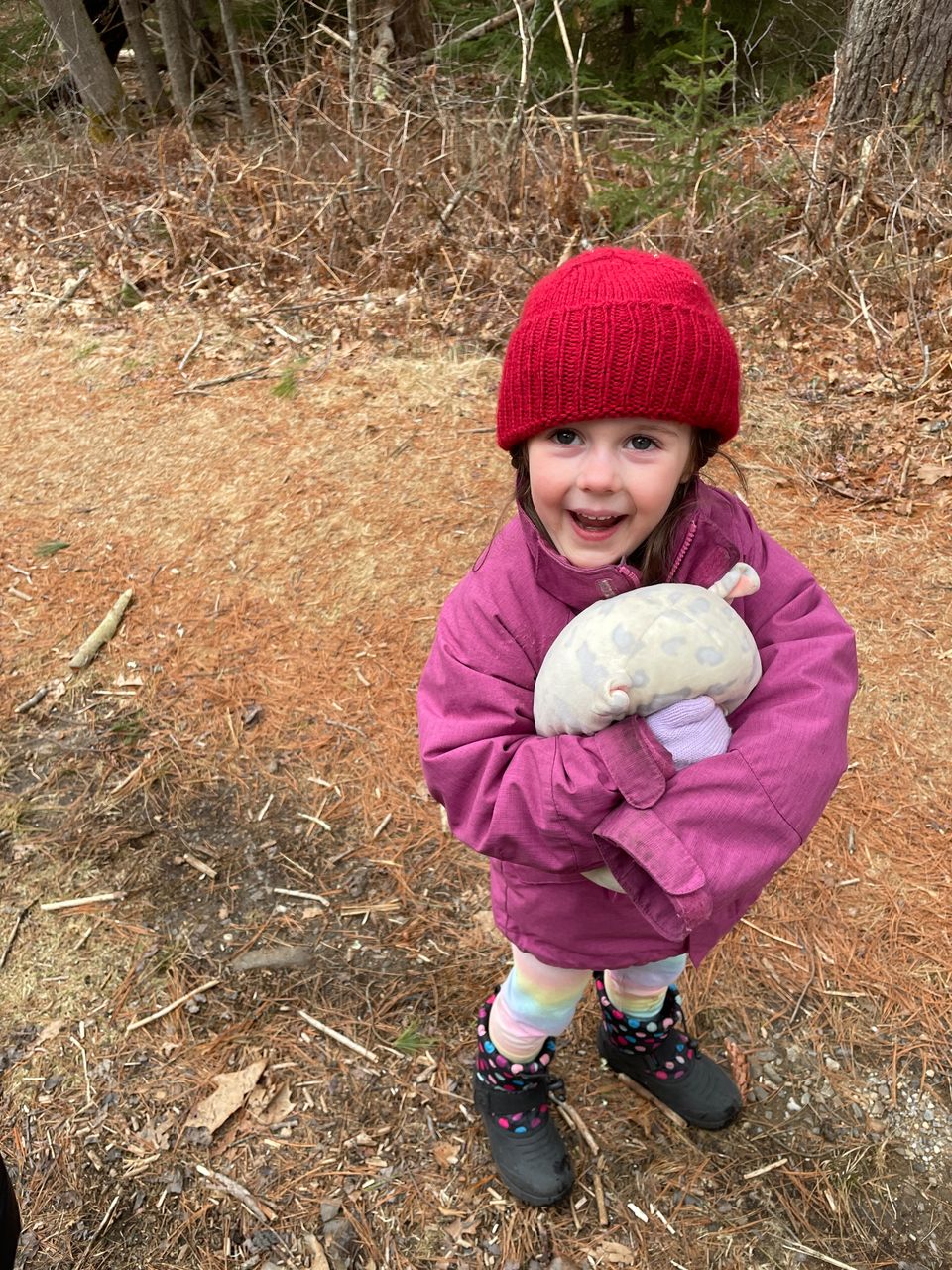
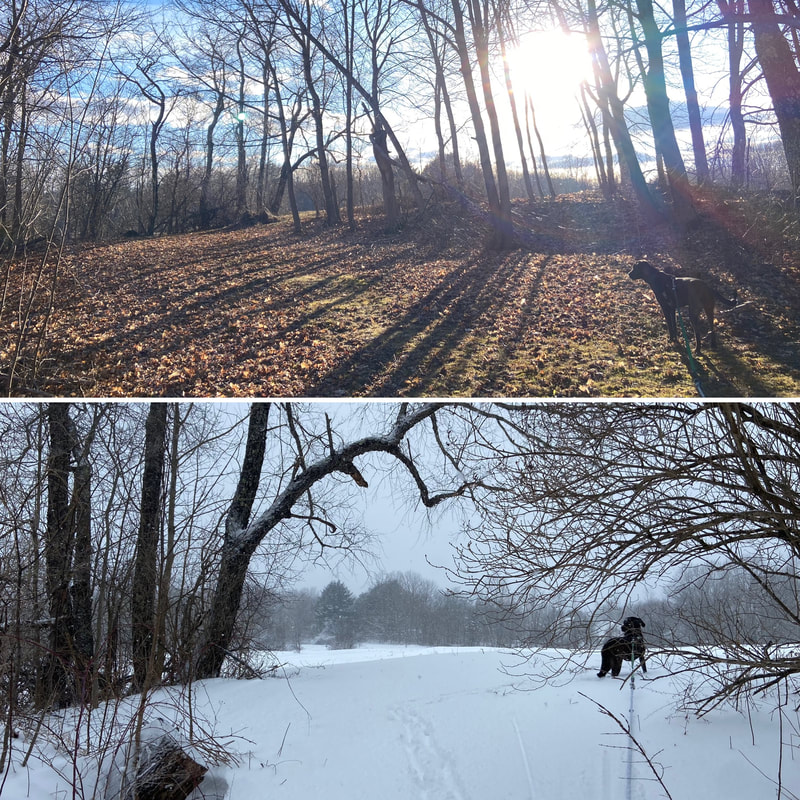
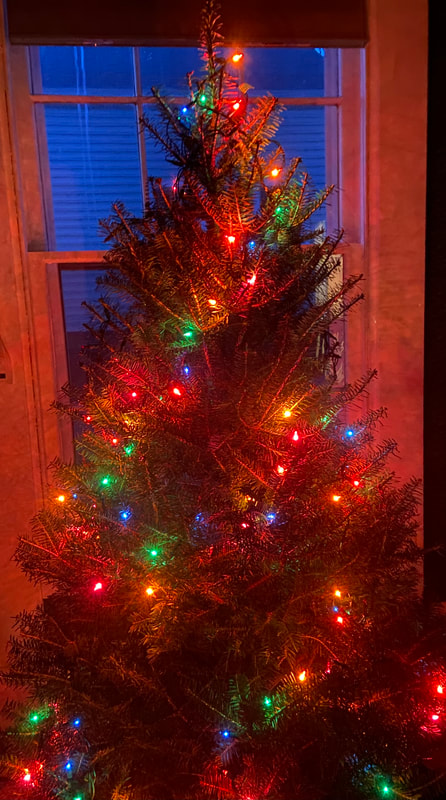
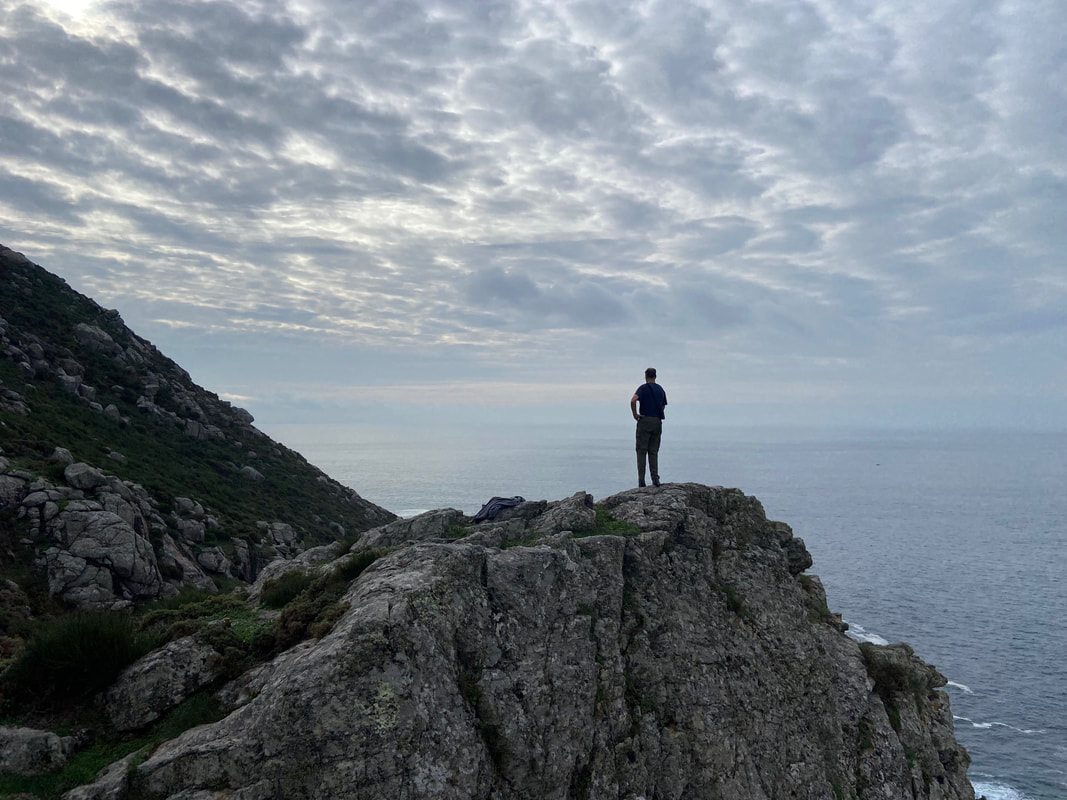
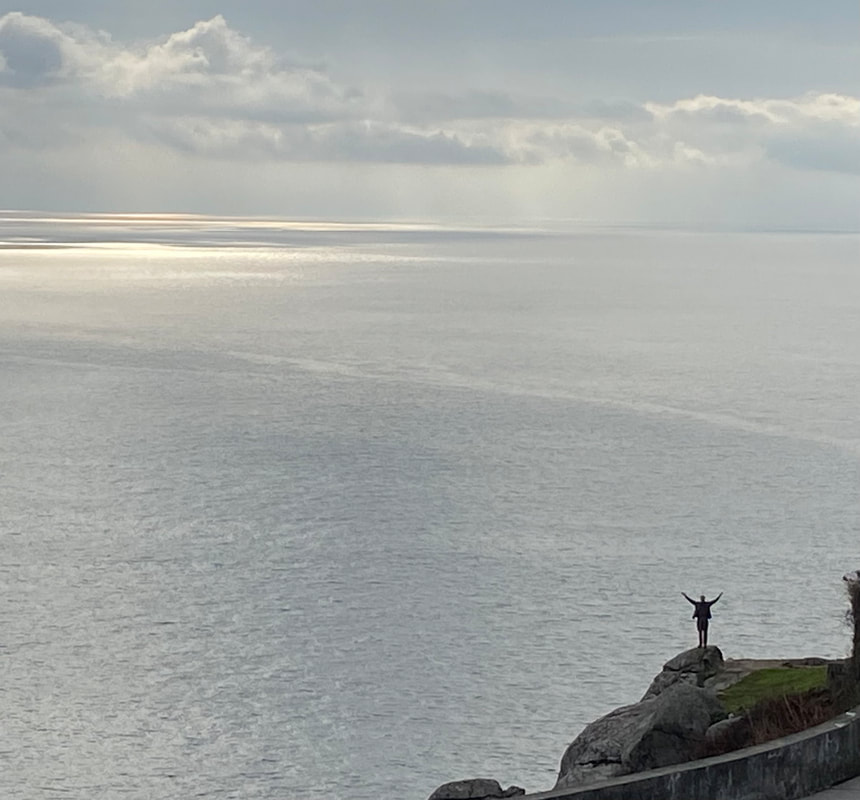
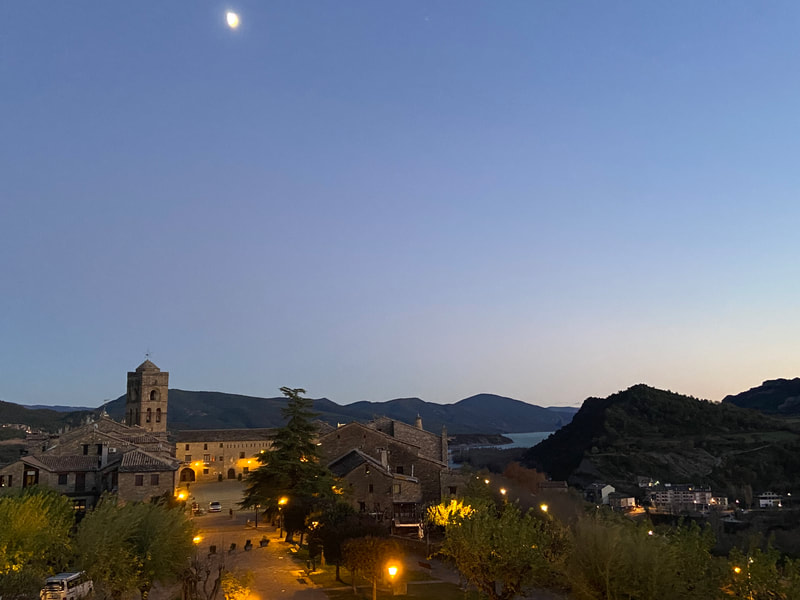
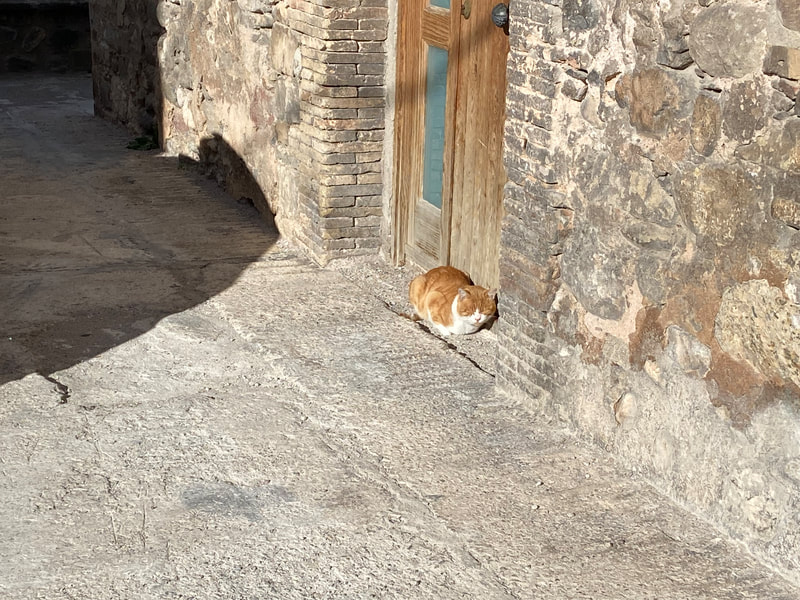
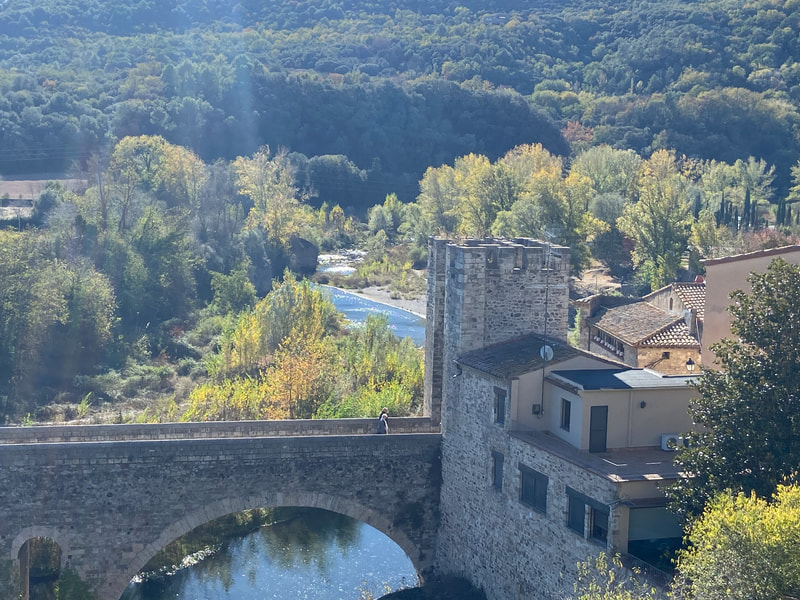
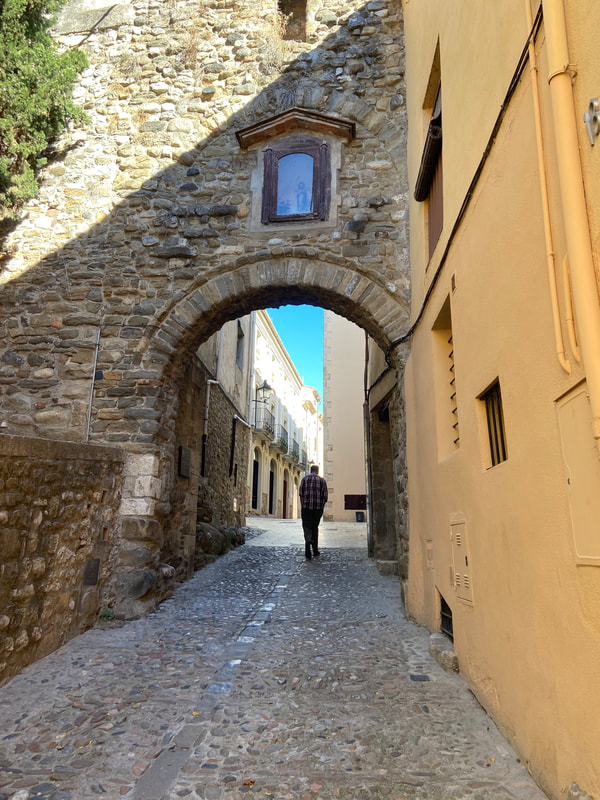
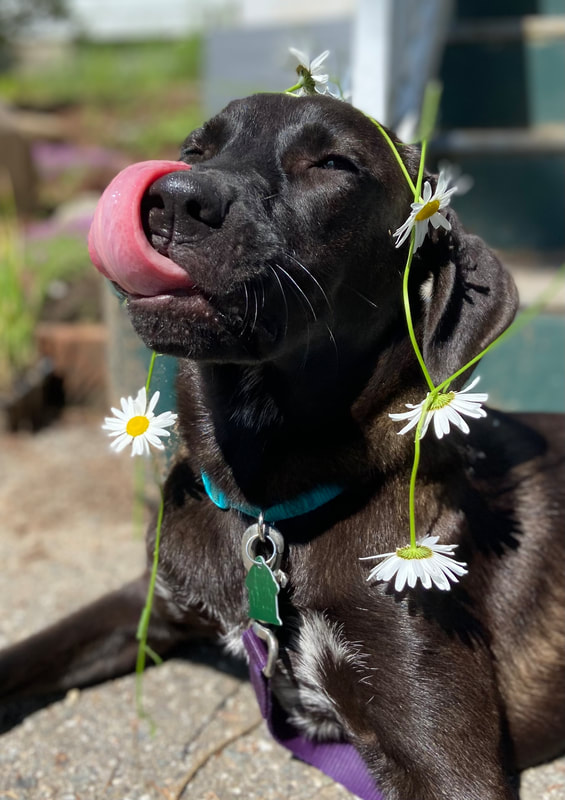
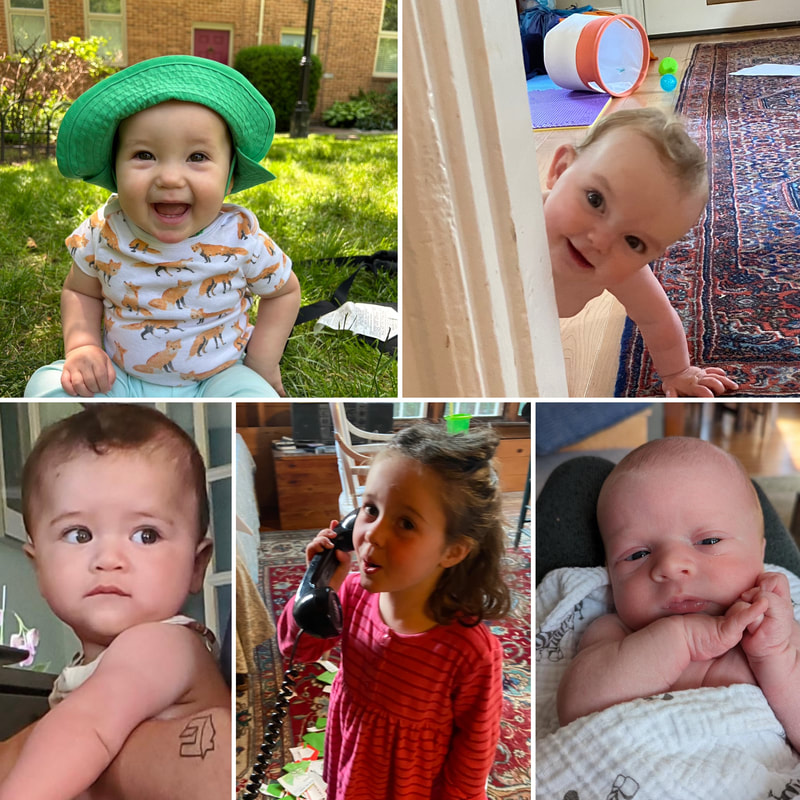
 RSS Feed
RSS Feed